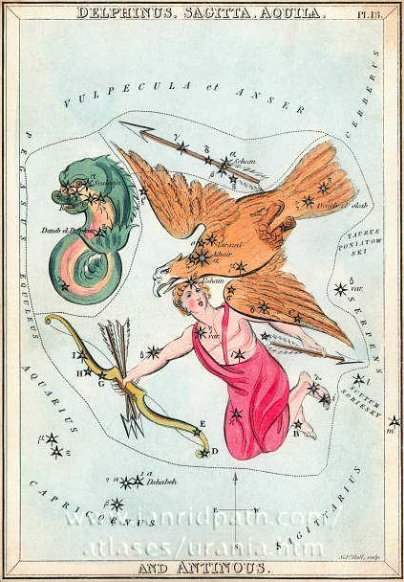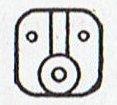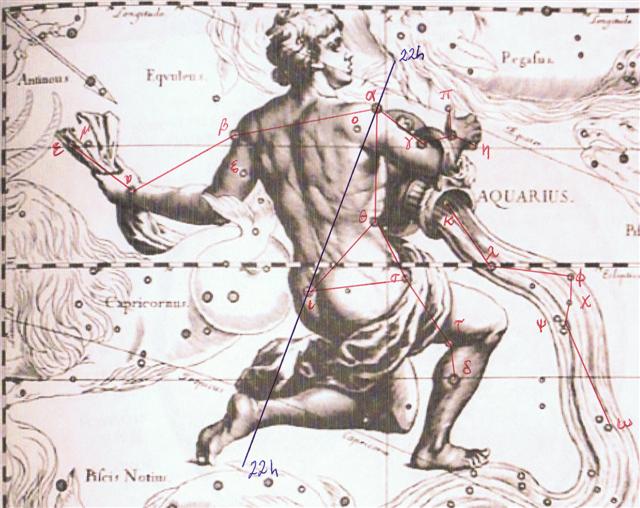At the time of
the Pope Gregory XIII
precession had
moved the stars
ahead with 60
days compared to
the time of the
Hyades Gate.
Instead of 232
(= 8 * 29) days
from 0h there
were now 232 +
60 = 292 (= 4 *
73) days from 0h
to κ
Aquilae far down at
the right leg of
the boy Antinous who was
uplifted in the
claws of the
Eagle.

 |
 |
 |
68 |
| Gb1-1 (230) |
Gb1-2 |
Gb1-3 |
| November 6 |
7 (311) |
8 (*232) |
| Deneb Okab (294.0), α Vulpeculae (294.9) |
ν Aquilae (Ant.) (295.0), Albireo (295.5) |
μ Aquilae (296.3), ι Aquilae (Ant.) (296.8), κ Aquilae (Ant.) (296.9) |
| January 9 |
10 (375) |
11 |
| ºJanuary 5 |
6 (371) |
7 (*292) |
 |
 |
 |
 |
 |
| Gb3-11 (301) |
Gb3-12 |
Gb3-13 |
Gb3-14 (π) |
Gb3-15 |
| January 16 |
17 |
18 (383) |
19 |
20 |
| Al Fargh al Thāni-25 |
Uttara Bhādrapadā-27 / Wall-14 |
χ Pegasi (2.1), θ Andromedae (2.7) |
σ Andromedae (3.0), ζ Tucanae (3.5), π Tucanae (3.7), ρ Andromedae (3.9) |
no star listed (4) |
| 0h (365.25) |
| Caph, SIRRAH (0.5), ε Phoenicis (0.8) |
ALGENIB PEGASI (1.8) |
| March 21 (80) |
22 (446) |
23 (383 + 64) |
24 (14 * 32) |
25 |
| ºMarch 17 |
18 (77) |
19 (443 = 383 + 60) |
20 (14 * 29½ + 31) |
21 (*0) |
| 'February 22 |
23 (Terminalia) |
24 (Bis-sextum) |
25 (14 * 4) |
26 (*342) |
| "February 8 |
9 (40) |
10 (*326) |
11 |
12 (408) |
| JULY 17 |
18 |
19 (200) |
20 |
21 (*122) |
| 12h (182.6) |
Alchita, Ma Wei (183.1), Minkar (183.7), ρ Centauri (183.9) |
Pálida (184.6), Megrez (184.9) |
Hasta-13 / Chariot-28 |
Chang Sha (186.3) |
| ο Virginis (182.1), η Crucis (182.5) |
GIENAH (185.1), ε Muscae (185.2), ζ Crucis (185.4), Zaniah (185.9) |
| September 19 |
20 |
21 (264) |
equinox |
23 |
| ºSeptember 15 |
16 |
17 (260) |
18 |
19 (*182) |
| 'August 23 |
24 (236) |
25 (*157 = 314 / 2) |
26 |
27 |
| "August 9 |
10 (222) |
11 |
12 (*144) |
13 |
By adding
another 73 days
to Gregorian
*292 a new time
0h would have
arrived, a new
time zero (*0),
with the
previous such
year ending
after 364 (= 14
* 26) days. 364
/ 2 - 168 = 14
and 14 * 25 =
350.
The claws of the
Eagle can be
contrasted with
the 'grasping
hand' of the
Raven:
|
CORVUS: |
|
13 |
Hasta |
α,
β,
γ,
δ, ε
Corvi |
Hand
or
fist |
185
=
178
+ 7 |
|
the
hand |
Gienah
(?) |
Sept
22
(265) |
| Egyptian hand |
 |
Phoenician kaph |
 |
Greek kappa |
Κ (κ) |
|
Kaph is thought to have been derived from a pictogram of a hand (in both modern Arabic and modern Hebrew, kaph means palm/grip) ...
... The manik, with the tzab, or serpent's rattles as prefix, runs across Madrid tz. 22 , the figures in the pictures all holding the rattle; it runs across the hunting scenes of Madrid tz. 61, 62, and finally appears in all four clauses of tz. 175, the so-called 'baptism' tzolkin. It seems impossible, with all this, to avoid assigning the value of grasping or receiving. But in the final confirmation, we have the direct evidence of the signs for East and West. For the East we have the glyph Ahau-Kin, the Lord Sun, the Lord of Day; for the West we have Manik-Kin, exactly corresponding to the term Chikin, the biting or eating of the Sun, seizing it in the mouth.

 
The pictures (from Gates) show east, north, west, and south; respectively (the lower two glyphs) 'Lord' (Ahau) and 'grasp' (Manik). Manik was the 7th day sign of the 20 and Ahau the last ... |
The Babylonians
had a Dead
Man uplifted
by an Eagle,
but at that time
the season was
not spring
equinox but
rather winter
solstice, when
the spirit of
the old Sun
('Dead Man')
should be
uplifted to the
starry heavens,
then to follow
the Milky Way in
order to be
reincarnated in
spring - where
the Sun may have
returned to the
ground in form
of an Old Man
once again
alive:

The flight
across from
midwinter to
spring may have
taken 73 nights,
during which the
earth was
covered with
water. The
Old Man
appears to carry
a circular
object formed
from
6 circles and
with a
handle at the
top.
When in
Babylonian times
the water
covered the
earth it was a
bad time, but
later, when
in spring the
water covered
the earth, it was
a lucky time.
"In Babylonia it
[Aquarius] was
associated with
the 11th month
Shabatu,
the Curse of
Rain,
January-February;
and the Epic of
Creation has an
account of the
Deluge in its
11th book,
corresponding to
this the 11th
constellation;
each of its
other books
numerically
coinciding with
the other
zodiacal signs."
(Allen)

In rongorongo
times January
was no longer at
heliacal
Aquarius and if
we assume
Babylonian times
may have been equal
to the time of
Bharani
(41 precessional
days earlier),
then we should
look for the
onset of
Aquarius in
early February,
possibly when
Bunda
(ξ Aquarii) rose
with the Sun and
Sirius
culminated at
midnight:
| *325 |
east |
west |
west |
east |
 |
| summer solstice |
winter solstice |
 |
 |
 |
 |
 |
 |
| Gb2-6 (261) |
Gb2-7 |
Gb2-8 |
Gb2-9 |
Gb2-10 |
Gb2-11 |
| *261 = 325 - 64 |
*262 (342) |
*263 |
*264 |
*265 |
*266 (Dec 12) |
| Al Sa'd al Su'ud-22 / Emptiness-11
BUNDA (Foundation) / KAKKAB NAMMAΧ (Star of Mighty Destiny) |
θ Piscis Austrini (330.1) |
| Tsin (325.2), Alphirk (325.7), SADALSUD, ξ Gruis (325.9) |
no star listed (326) |
Castra (327.2), BUNDA (327.5)
Sirius
|
Nashira (328.0), Azelfafage, κ Capricorni (328.7) |
ENIF, Erakis (329.2), 46 Capricorni, Jih (329.3), ι Piscis Austrini (329.4), λ Capricorni (329.6), ν Cephei (329.7), DENEB ALGIEDI (329.8) |
| Febr 9 (40) |
10 |
11 |
12 |
13 |
14 |
|












